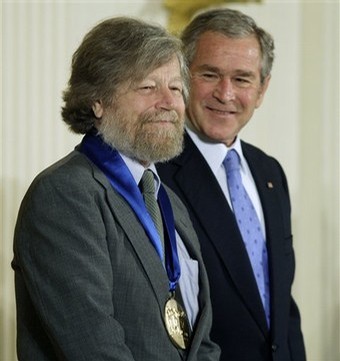

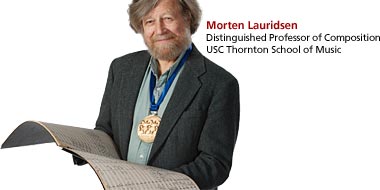 BD: Teaching of
what — composition?
BD: Teaching of
what — composition?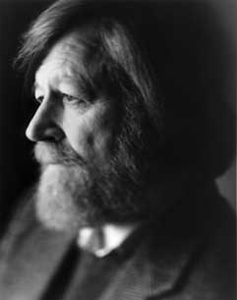 BD: Oh, I thought
you used the island like the
MacDowell Colony to write.
BD: Oh, I thought
you used the island like the
MacDowell Colony to write.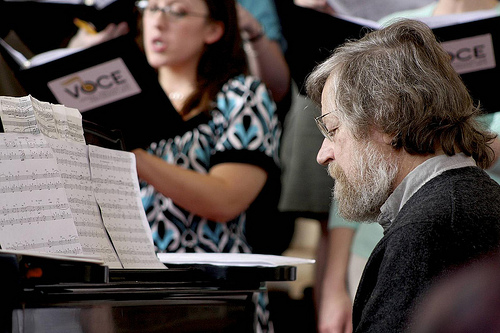 ML: I’ve said yes
to
the Los Angeles Master Chorale. My appointment there in 1994
seemed like a good fit between conductor and ensemble and
composer. I had a body of choral works that were having success
at that time. It’s like being married in the sense;
I’ll stay the course with them until Paul retires and
then I will certainly retire along with him, because
whoever they have as a new conductor should bring in their new Composer
in Residence with them. Then perhaps I can say yes to other
people such as Chanticleer. I’ve had to say no to them so
far! I’ve been asked to write the major commission
piece for the A.C.D. convention for the next two years and I’ve
had to say to people, “Look, I balance a lot of juggling balls
here. I’m chair of a department in a major university; I
have to have my space on this island; I write slowly; I’m a
reviser and right now I’m committed to a group. Once that
commitment is done, then perhaps we can talk.” But a lot of it
will have to do with the group that asks me.
ML: I’ve said yes
to
the Los Angeles Master Chorale. My appointment there in 1994
seemed like a good fit between conductor and ensemble and
composer. I had a body of choral works that were having success
at that time. It’s like being married in the sense;
I’ll stay the course with them until Paul retires and
then I will certainly retire along with him, because
whoever they have as a new conductor should bring in their new Composer
in Residence with them. Then perhaps I can say yes to other
people such as Chanticleer. I’ve had to say no to them so
far! I’ve been asked to write the major commission
piece for the A.C.D. convention for the next two years and I’ve
had to say to people, “Look, I balance a lot of juggling balls
here. I’m chair of a department in a major university; I
have to have my space on this island; I write slowly; I’m a
reviser and right now I’m committed to a group. Once that
commitment is done, then perhaps we can talk.” But a lot of it
will have to do with the group that asks me.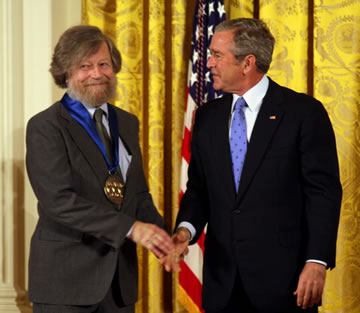 ML: Sure,
absolutely! Yes, my scores have
certainly succeeded in a certain level, and I would say of course study
my scores. There are very few people, I think, such as myself, at
least in America, that have devoted themselves almost exclusively in
the last few years to writing choral music. You
find so many very fine composers that simply feel uncomfortable in
writing vocal music, and they just don’t do it at all. But I
think part of the criterion of this is to have a great love for poetry.
ML: Sure,
absolutely! Yes, my scores have
certainly succeeded in a certain level, and I would say of course study
my scores. There are very few people, I think, such as myself, at
least in America, that have devoted themselves almost exclusively in
the last few years to writing choral music. You
find so many very fine composers that simply feel uncomfortable in
writing vocal music, and they just don’t do it at all. But I
think part of the criterion of this is to have a great love for poetry.|
|
This interview was recorded in Chicago in March of
1999. Portions were used (along with recordings) on WNIB in 2001.
This
transcription was made in 2008 and posted on this
website in September of that year.
To see a full list (with links) of interviews which have been transcribed and posted on this website, click here.
Award - winning broadcaster Bruce Duffie was with WNIB, Classical 97 in Chicago from 1975 until its final moment as a classical station in February of 2001. His interviews have also appeared in various magazines and journals since 1980, and he now continues his broadcast series on WNUR-FM, as well as on Contemporary Classical Internet Radio.
You are invited to visit his website for more information about his work, including selected transcripts of other interviews, plus a full list of his guests. He would also like to call your attention to the photos and information about his grandfather, who was a pioneer in the automotive field more than a century ago. You may also send him E-Mail with comments, questions and suggestions.